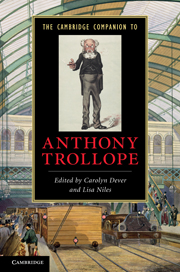Book contents
- Frontmatter
- Introduction
- 1 Trollope’s Literary Life and Times
- 2 Trollope As Autobiographer And Biographer
- 3 Trollope’s Barsetshire Series
- 4 The Palliser Novels
- 5 Trollope Redux: The Later Novels
- 6 Trollope’s Short Fiction
- 7 Trollope And The Sensation Novel
- 8 Queer Trollope
- 9 The hobbledehoy in Trollope
- 10 The construction of masculinities
- 11 Vulgarity and money
- 12 Trollope and the law
- 13 Trollope and travel
- 14 Trollope and the Antipodes
- 15 Trollope and Ireland
- 16 Trollope and America
- Further reading
- Index
- Cambridge Companions to . . .
11 - Vulgarity and money
Published online by Cambridge University Press: 28 March 2011
- Frontmatter
- Introduction
- 1 Trollope’s Literary Life and Times
- 2 Trollope As Autobiographer And Biographer
- 3 Trollope’s Barsetshire Series
- 4 The Palliser Novels
- 5 Trollope Redux: The Later Novels
- 6 Trollope’s Short Fiction
- 7 Trollope And The Sensation Novel
- 8 Queer Trollope
- 9 The hobbledehoy in Trollope
- 10 The construction of masculinities
- 11 Vulgarity and money
- 12 Trollope and the law
- 13 Trollope and travel
- 14 Trollope and the Antipodes
- 15 Trollope and Ireland
- 16 Trollope and America
- Further reading
- Index
- Cambridge Companions to . . .
Summary
Anthony Trollope’s novels reflect, with more nuance than almost any other works in the Victorian canon, the complex English reaction to the fact that, in the period when he was writing, “for the first time in history, non-landed incomes and wealth had begun to overtake land alone as the main source of economic power.” Associated with England’s rise to world dominance as a financial power, these economic changes triggered a powerfully ambivalent response. The English were at one and the same time proud of their country’s commercial achievements and fearful that those achievements meant they were living in a plutocracy, a nation ruled by wealth. Trollope’s novels capture this ambivalence with peculiar intensity. They show all the good things that money allows individuals to do and acquire, while at the same time underscoring the culture’s propensity to both worship and misuse the forms of wealth that developed as England’s financial power began to rest in banking and sales rather than land and production. Trollope’s emphasis on the positives and negatives of the new wealth led critics to perceive him as excessively concerned with money; “no other novelist . . . has made the various worries connected with want of money so prominent a feature in most of his stories” (Crit. Her. 216). In a world that wanted to deny and rise above the power of wealth, Trollope insistently reminded readers of the material sources that fueled England’s greatness. For Victorian critics, the word that most accurately conveyed the dangers of Trollope’s materialist leanings was vulgarity.
- Type
- Chapter
- Information
- The Cambridge Companion to Anthony Trollope , pp. 142 - 154Publisher: Cambridge University PressPrint publication year: 2010

